There was an interesting new poll out the other day on public attitudes to marijuana and the possibility of law reform (on which there is to be a referendum at the time of next year’s election). The results certainly took me by surprise.
For the record, I don’t have very strong views on the law around marijuana. A couple of years ago I’d got to the point where I’d probably have voted for full liberalisation, but since then I’ve swung back somewhat in the other direction (influenced in part by reviews of and extracts from this recent book, a copy of which I’m expecting in the mail any day now). In an up/down vote today I’d probably vote against full liberalisation, but as to how I will actually vote next year, a lot might depend on the specific question. One thing I really don’t like is a law on the books that isn’t generally enforced, but which leaves our untrustworthy Police free to use it when it suits them.
But I’d been under the impression that New Zealand public opinion was pretty favourable to substantial liberalisation of “recreational” use of marijuana. So I wasn’t expecting this result. Asked “which of the following statements comes closest to your opinion on cannabis?”, responses were as follows
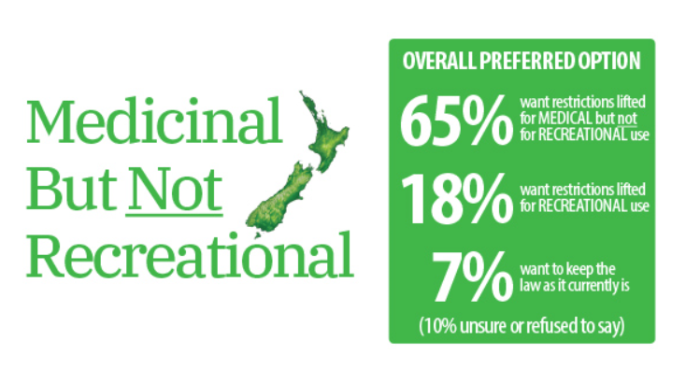
The margins of error get quite large quite quickly once the results are broken down, but young people are probably more favourable to liberalisation than old people, poor people probably more favourable than better-off people, and National voters much less favourable than Green voters (but only 53 per cent of the latter favoured liberalisation of recreational use, as posed this way).
The poll was commissioned by Family First who have been opposed to liberalisation of recreational use. In itself, that doesn’t invalidate the results (probably almost anyone likely to be polling in this area in New Zealand is likely to be motivated in one direction or the other) but it is worth thinking about whether the questions posed are especially likely to skew the answers one way or the other.
One problem is this area is the array of possible options. As someone without an intense interest in the topic, I struggle to remember the difference between, say, decriminalisation and legalisation, and as Family First notes the poll deliberately didn’t focus on either of those more-technical terms, asking instead about “lifting restrictions”. In principle, you can lift restrictions partially or fully, and when I first looked at the question my immedate reaction was that it encompassed both. But perhaps many of the interviewees took “lifting restrictions” as removing all restrictions and penalties? If so, that might help explain why support for recreational liberalisation appears so low.
Perhaps there is also an issue with posing both the medicinal and recreational options in the same question. While lifting (in part or in full) restrictions on recreational use would seem to encompass freeing up medicinal use, it doesn’t actually say that. Perhaps some people who care quite a bit – or want to go on record as caring quite a bit – about medicinal use plumped for that option, even if they actually favoured recreational use liberalisation, to ensure a resounding explicit vote on medicinal. Presumably that won’t be the way next year’s referendum will be framed?
Some of the other results in the poll were also interesting. There were six questions, and the questions on policy preferences is the last of them. The preceding questions might, in principle, (been framed to?) influence how people answered the final question.
The first question was
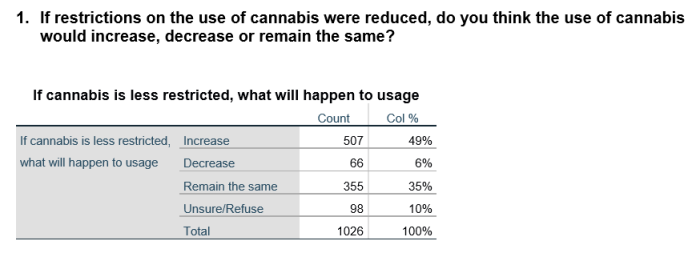
I’d have answered “increase” too, and I don’t think that result should be too surprising. Reduce the effective price and, all else equal, consumption is likely to rise. Note that the question is framed around “reducing” restrictions on use of cannabis, not about more specific choices, and that seems fine.
The second question was more puzzling
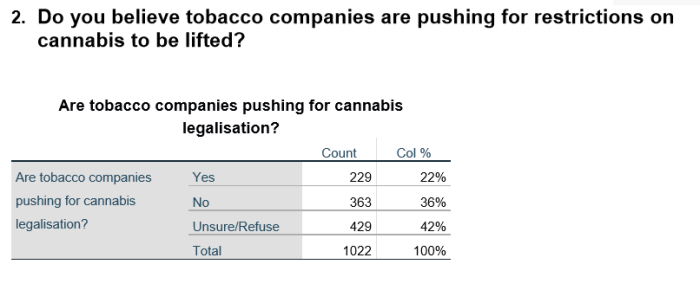
I don’t know (and probably would have said so), but it would probably be rational for them to do so (the possibility of a new substance to market, and perhaps undermining restrictions on tobacco). But one might wonder why the question was asked? To prompt people to associate liberalisation with “big tobacco”?
What about question 3?
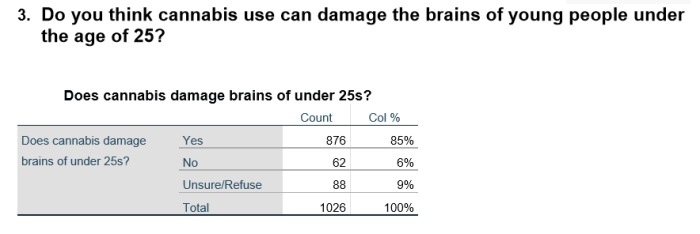
This seems to be a pretty widespread concern (among serious opponents of liberalisation) so not an unreasonable question. But note the “can” – which is a possibility, and thus more likely to get a positive response than, say, a “does”. Even 95 per cent of Greens voters – people who end up favouring recreational liberalisation – ended up saying “yes” to this one.
And then question 4
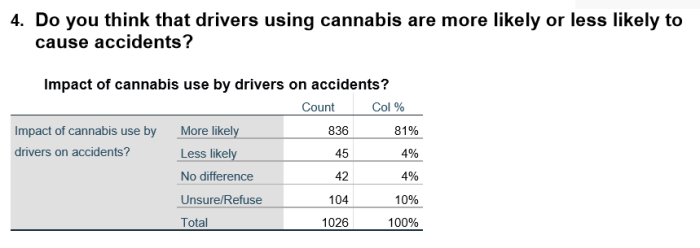 Again, it is an argument you see around (including reviewing the experiences of US states that have liberalised), and actually the question doesn’t seem posed unfairly (both “more likely” and “less likely” are explicitly mentioned), and there is an overwhelming vote for “more likely”. Of course, there might be a selection issue at work: respondents might think people likely to take marijuana were also already younger and less responsible (more risk-taking perhaps) so they might not be directly asserting causation.
Again, it is an argument you see around (including reviewing the experiences of US states that have liberalised), and actually the question doesn’t seem posed unfairly (both “more likely” and “less likely” are explicitly mentioned), and there is an overwhelming vote for “more likely”. Of course, there might be a selection issue at work: respondents might think people likely to take marijuana were also already younger and less responsible (more risk-taking perhaps) so they might not be directly asserting causation.
Perhaps the same issue arises with question 5.
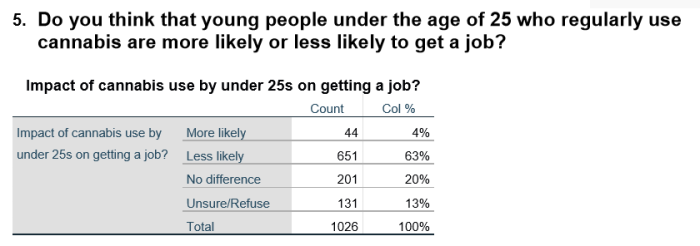
Even 46 per cent of Green voters said “less likely” to this one, but again it isn’t quite clear what will have been going in behind the responses. Some people will have been thinking ‘well, many firms have drug tests, and if you take drugs you will fail those tests and not get a job”. Others will have been reflecting views on the potential work ethic of those who might take jobs. Others again will have been worried about the potential mental illness effects (see earlier questions).
I don’t have too much of a problem with asking any of the questions that led up to question 6 (views on liberalisation itself). After all, when the referendum comes people won’t be voting in a vacuum but will face a plethora of arguments, evidence, and pseudo-evidence on both sides. Of course, if one wanted totally disinterested poll results – wouldn’t that be great – one might have wanted some other questions interspersed reflecting some of the arguments of those who favour liberalisation. Perhaps “do you think people should be free to choose what they inject or inhale, without state restrictions?” or “even if you personally would never consider taking marijuana, do you believe Police should have discretionary power, often not exercised, to prosecute those who do?”, or “do you think current marijuana law encourages or discourages criminal gangs” or the like.
In the end, I’m not sure quite what to make of the results. No doubt, the questions could be asked, and framed, in ways that produced higher numbers in favour of reduced restrictions on recreational use, and I doubt that – in any real sense – only 18 per cent of New Zealanders favour some liberalisation of recreational use. But I’m still left a bit surprised that, even on the questions asked on this poll, the support numbers weren’t higher.
Perhaps the result of next year’s referendum really will depend a lot on the specific question asked. It would be good if, before long, the government were to give us some specifics on that, and on the whole associated regulatory or tax regime they are proposing.
An interesting anecdotal side issue Michael. I was in Hong Kong two weeks ago and net with an Educational agent who arranges for Hong Kong students to attend schools overseas.
A large part of his business has traditionally been in Canada where himself lived and studied for many years (he is HK Chinese).
He commented that the numbers of HK students going to Canada has dropped since marijuana liberalisation there. HK parents he says are wary of putting their kids into what they see as a more risky environment.
LikeLiked by 1 person
Interesting
LikeLike
Seems rather blinkered. In the years I was in HK drug availablity among school aged children was not a problem. Marijuana not being the most popular.
LikeLike
Indeed, Hong Kong was and likely still is a central hub of triad and drug activity. I watched on Netflix, the movie, Chasing the Dragon, casting Donnie Yen as a drug lord kingpin sided and abetted by the local Hong Kong police chief and corrupt British officials. Together they built a drug empire controlling the trade from the Golden Triangle in Thailand. When the police finally started a crackdown on their corrupt police chief he fled to Canada and brought the drug trade with him.
LikeLike
Any simple question, let alone referendum, can be phrased in different ways. It all depends on how you want to be able to steer the results. The final referendum questions will simply reflect the answer those setting them want.
Just look at how the euthanasia bill has been twisted and hijacked by those that claim neutrality yet are trying to stack the deck.
LikeLiked by 1 person
Reblogged this on Utopia – you are standing in it! and commented:
I think the referendum for full legalisation will lose.
LikeLike
I assume that the headline result was the last question? Watch this and then consider how valid that result is: https://www.youtube.com/watch?v=G0ZZJXw4MTA
BTW I would have voted with the 65% without any pre-conditioning.
LikeLike
When I saw the results I wondered if it was commissioned by the alcohol industry but then saw it was family First. I don’t have much of a position except that a) you can grow it in your backyard b) it makes you a wombat. These polls are so suspect??????he who pays the piper calls the tune?
LikeLike
The suggestion you are making is the popular stoner conspiracy that big-alcohol pushes to keep cannabis illegal to maintain their profits – as if there is a zero sum game between cannabis and alcohol. A giant alcohol manufacturer could just as easily move into cannabis manufacture and distribution – no doubt there are synergies across the industries that could be exploited. People can grow their own of course, but growing tobacco is similarly easy, but most people didn’t do it.
LikeLike
My major concern is how polls are used as a proxy for public opinion. Imagine the sort who work for polling companies. Apparently “Iris” who Sean Plunkett roasted over Jordan Peterson works for Colmar-Brunten.
LikeLike
Decriminalisation vs legalisation is a popular trick for obscuring the true nature of the proposal. Neither term has an objective definition in law, but I have understood (based on a basic parsing of English) legalisation to be the removal of any restriction (save for perhaps reasonable licensing arrangements or excise taxes). Decriminalisation would maintain a prohibition on the activity, the difference being how that is enforced. Driving over the speed limit, or parking in a non-parking zone are not allowed, but the consequence is getting a ticket – once paid there is no enduring record which could be used against you in assessing a sentence for a future crime.
The prostitution reforms in early 2000s were always discussed as decriminalisation, but in my view were legalisation. I am not against those reforms as such, but considered that labelling them as decriminalisation was dishonest and done solely to improve the image of the reforms.
I note your comment about the laws going unenforced – Peter Hitchens in the UK has made the argument there that there is a circular argument around the laws willfully going unenforced, which is then used as an argument to say there is no point to trying to enforce them. I would be interested to know what the situation is like in NZ. I was aware from my time at high school and uni in late 90s/00s of a number of peers who were stopped by police and had their gear confiscated but nothing further happening. Some chaps I knew were even caught growing it, but got diversion. There are still obviously possession convictions being made, but my suspicion is most are due to the convicted person being arrested and convicted for other things, but coincidentally having cannabis on them. From a justice point of view, it is very undesirable to have laws going unenforced, or being enforced randomly. Most of the people I knew getting diversion/verbal warnings etc would have been white middle class, and this discretion is probably not equally applied say to Maori.
LikeLike
Could it be the country is really more conservative, on things like drug use, than we are led to believe? The people that end up as the elected representatives of our parliament may not reflect accurately the views of the nation in proportion, though they act like they do. And it’s only when you have a national referendum is there a opportunity to match population view against parliamentary view. John Key toyed with this over the proposal to change the New Zealand flag. The rejection of the idea by the public surprised many who though all the forward looking arguments had won. Even Sam Neil was in favour.
So I wonder if the referendum on cannabis use will deliver the change the progressives hope for. I suspect maybe not.
LikeLike